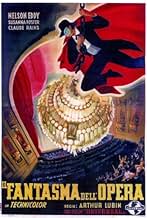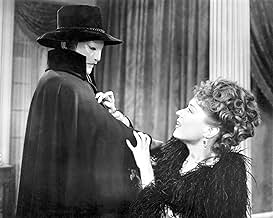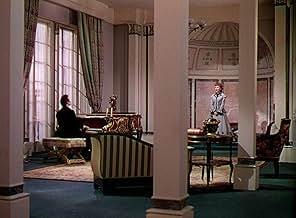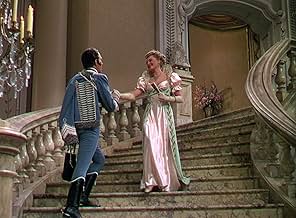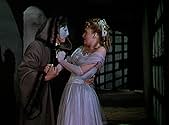NOTE IMDb
6,4/10
9 k
MA NOTE
Ajouter une intrigue dans votre langueAn acid-scarred composer rises from the Paris sewers to boost his favorite opera understudy's career.An acid-scarred composer rises from the Paris sewers to boost his favorite opera understudy's career.An acid-scarred composer rises from the Paris sewers to boost his favorite opera understudy's career.
- Réalisation
- Scénario
- Casting principal
- Récompensé par 2 Oscars
- 3 victoires et 5 nominations au total
Kate Drain Lawson
- Landlady
- (as Kate Lawson)
Avis à la une
Poor old Enrique Claudin doesn't have much luck – and what he does have is all bad. An adept but unremarkable violinist with the Paris Opera House, he secretly worships Christine Dubois, the young understudy to the snooty leading songstress, and even goes so far as to anonymously spend all his money on singing lessons for her even though she is barely conscious of his existence. Enrique loses his job when he starts losing the feeling in his fingers. Then he mistakenly believes the musical manuscript he has been working on has been stolen by no less a light than Franz Liszt (Lord only knows how he wandered into this). Gripped by a violent rage, Enrique throttles the bad-tempered music publisher who prevents him from retrieving his manuscript and ends up with a face full of acid courtesy of the publisher's panicky secretary. Evading capture by the police, Enrique hides in the sewers beneath the Opera House and, like a tomato that's rolled under the cooker, grows dark and warped in the darkness.
Gaston Laroux's Phantom of the Opera is one of those stories that filmmakers feel compelled to retell every couple of years, so there's not a great deal to set this apart from all those other versions. Universal's use of colour is uncharacteristically sumptuous, and given that this tale falls nominally into the horror category for which they were famed, it stands by comparison to their other output of the time as something of a prestige production. There's not really much horror to speak of – although, by modern standards, none of the 40s horror films are likely to scare anyone over the age of five, so it's not out of the ordinary there. In fact it would arguably be more accurate to describe it as a musical given the amount of time that's given over to opera numbers that do little other than pause the action.
Claude Rains gives a typically polished performance as the tormented Claudin, although the failure of the script to get under his character's (scorched) skin once he assumes the identity of the Phantom leaves the actor with little to work with once he dons the mask and descends into B-movie madness. Nobody else in the cast really stands out. Susanna Foster makes a rather unmemorable ingénue (who shows worrying indications of following the same path as the prima donna she replaces given the way some of their lines are nearly identical), and leaves you wondering why poor old Claudin got so hot and bothered over her in the first place. Nelson Eddy and Edgar Barrier provide some light relief as the troupe's baritone and the investigating police officer, both of whom also fall under Miss Foster's mysterious spell.
Phantom of the Opera provides a good example of 40s Hollywood expertise (although it looks more like an MGM film than a Universal), and is entertaining enough even though it rarely provides anything that's likely to stick in the mind. Arthur Lubin at least attempts moments of artistry – for example by having the camera repeatedly passing sources of light – candelabras, chandeliers, etc – to suggest the fatal fascination Claudin's object of unrequited love holds for him.
Gaston Laroux's Phantom of the Opera is one of those stories that filmmakers feel compelled to retell every couple of years, so there's not a great deal to set this apart from all those other versions. Universal's use of colour is uncharacteristically sumptuous, and given that this tale falls nominally into the horror category for which they were famed, it stands by comparison to their other output of the time as something of a prestige production. There's not really much horror to speak of – although, by modern standards, none of the 40s horror films are likely to scare anyone over the age of five, so it's not out of the ordinary there. In fact it would arguably be more accurate to describe it as a musical given the amount of time that's given over to opera numbers that do little other than pause the action.
Claude Rains gives a typically polished performance as the tormented Claudin, although the failure of the script to get under his character's (scorched) skin once he assumes the identity of the Phantom leaves the actor with little to work with once he dons the mask and descends into B-movie madness. Nobody else in the cast really stands out. Susanna Foster makes a rather unmemorable ingénue (who shows worrying indications of following the same path as the prima donna she replaces given the way some of their lines are nearly identical), and leaves you wondering why poor old Claudin got so hot and bothered over her in the first place. Nelson Eddy and Edgar Barrier provide some light relief as the troupe's baritone and the investigating police officer, both of whom also fall under Miss Foster's mysterious spell.
Phantom of the Opera provides a good example of 40s Hollywood expertise (although it looks more like an MGM film than a Universal), and is entertaining enough even though it rarely provides anything that's likely to stick in the mind. Arthur Lubin at least attempts moments of artistry – for example by having the camera repeatedly passing sources of light – candelabras, chandeliers, etc – to suggest the fatal fascination Claudin's object of unrequited love holds for him.
The splendor of Technicolor and the lavish opera sequences distinguish this version of the famous story. While this version bears little resemblance to the original, it does feature a first-rate performance by Claude Rains, in the title role. It certainly employs the best production values of any filmed version, and provides for high entertainment. Recommended.
This 1943 version is a remake of the 1925 version from the same studio (Universal). Probably the most vivid and effective use of Technicolor I have seen. Lush photography, great crane shots and an impressive Paris Opera House! The operatic scenes are very well done--and they are important to the story line. Very entertaining, especially since there is no graphic violence or gore--except the Phantom's face. Nelson Eddy is in top voice. One of Hollywood's most versatile actors, Claude Rains is remarkable in the lead role. Just the year before he was the memorable Prefect of Police in "Casablanca." This production is mounted first class in every way.
The DVD release is a fantastic transfer from an original old Technicolor master.
The DVD release is a fantastic transfer from an original old Technicolor master.
I'm not sure if I'd call this a horror movie(it's certainly a drama).It is the result of good acting,filming,and glorious color!!!!!!!I've never seen a Universal horror movie in color other than this!The story isn't a real adaption of Gaston Leroux's novel.It has several changes made that make it different from the book.It's a must-see for movie lovers.Horror or otherwise.
Anybody approaching 'Phantom Of The Opera' as a horror movie will probably be disappointed, but if you look upon it as a romantic melodrama it's pretty entertaining. The sets (mostly recycled from the twenties version) are lavish, the music is strong and the performances are good, especially the wonderful Claude Rains ('The Invisible Man', 'Casablanca', 'Notorious') who is excellent (as always). The rest of the cast includes songbirds Nelson Eddy and Susanna Foster, the late Hume Cronyn in a bit part, and a nice cameo from Fritz Leiber (the father of the famous science fiction and fantasy writer Fritz Leiber, Jr) as Franz Liszt. 'Phantom Of The Opera' is far from my favourite Universal horror movie but I still enjoyed it and it's worth watching, though I think in many ways the Hammer remake in the 1960s starring Herbert Lom is a better movie.
Le saviez-vous
- AnecdotesThe original script revealed Claudin to be Christine's father, who abandoned her and her mother in order to pursue a musical career. When this was excised from the final film, it left Claudin's obsession with Christine unexplained.
- GaffesWhen Christine takes the mask off from Phantom's face, we see that his scar reaches the low area of his right cheek, even the right eyelid is slightly fallen. But before that during the entire film, we never see a single mark of the scar on the uncovered area of the Phantom's face, not even the fallen eyelid through the mask.
- Citations
[Christine has left Raoul and Anatole in her dressing room while she greets a crowd of admirers]
Raoul D'Aubert: Would you join me for a bit of supper at the Cafe de l'Opera?
Anatole Garron: With pleasure, monsieur.
Raoul D'Aubert: Think we can get through this crowd?
Anatole Garron: Certainly. After all, who'd pay any attention to a baritone and a detective?
- ConnexionsFeatured in Weirdo with Wadman: Phantom of the Opera (1964)
- Bandes originalesLULLABY OF THE BELLS
(uncredited)
Written by Edward Ward
Lyrics George Waggner
Sung by Susanna Foster and Nelson Eddy
Meilleurs choix
Connectez-vous pour évaluer et suivre la liste de favoris afin de recevoir des recommandations personnalisées
- How long is Phantom of the Opera?Alimenté par Alexa
Détails
- Date de sortie
- Pays d’origine
- Langue
- Aussi connu sous le nom de
- El fantasma de la ópera
- Lieux de tournage
- Société de production
- Voir plus de crédits d'entreprise sur IMDbPro
Box-office
- Budget
- 1 500 000 $US (estimé)
- Durée1 heure 32 minutes
- Mixage
- Rapport de forme
- 1.37 : 1
Contribuer à cette page
Suggérer une modification ou ajouter du contenu manquant

Lacune principale
By what name was Le fantôme de l'opéra (1943) officially released in India in English?
Répondre


